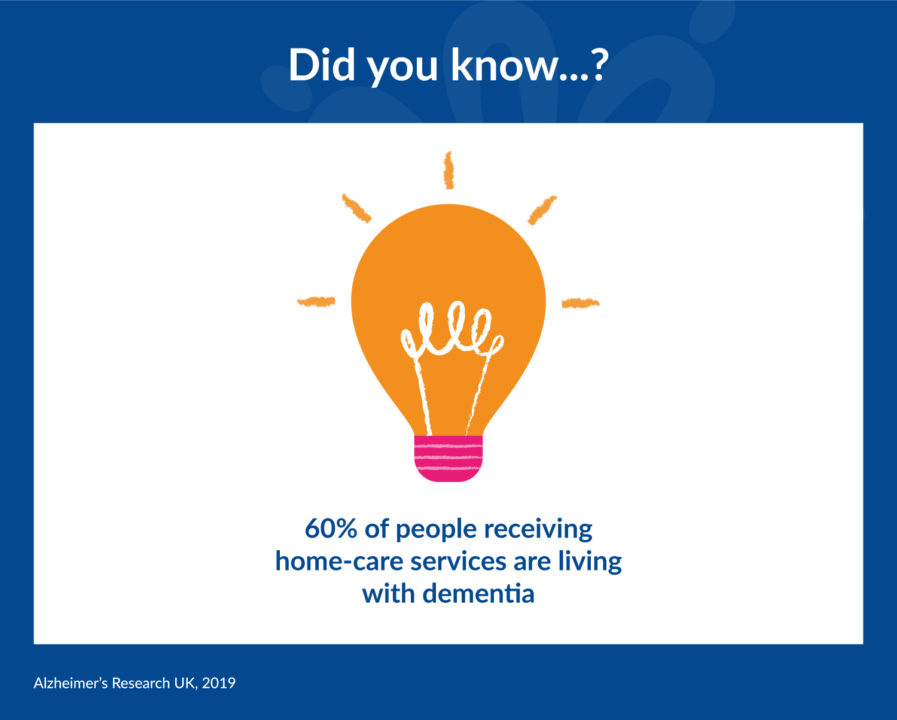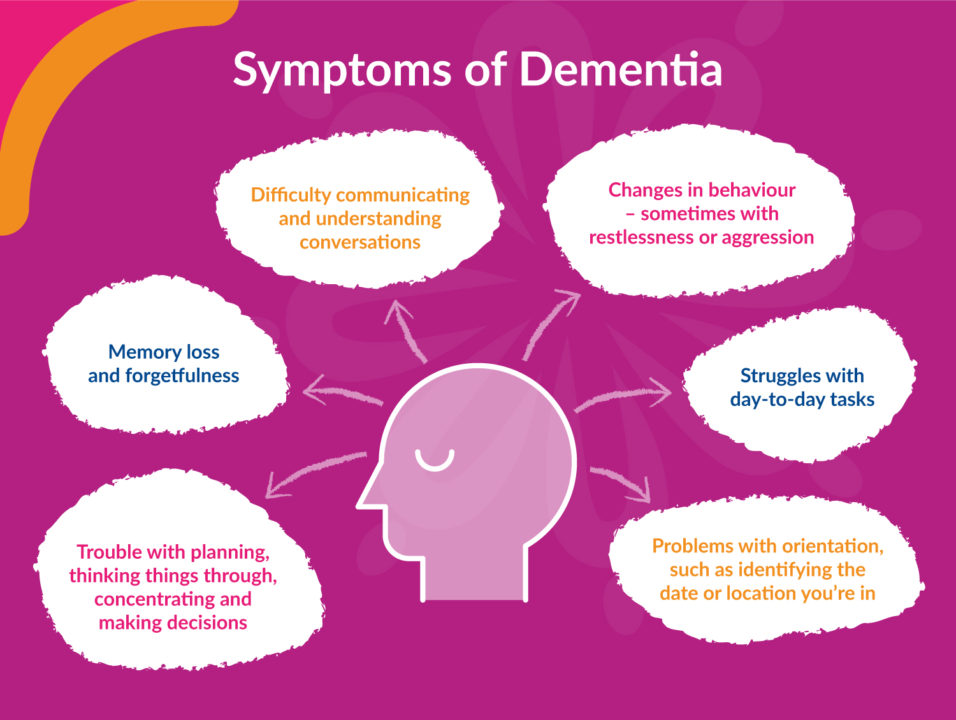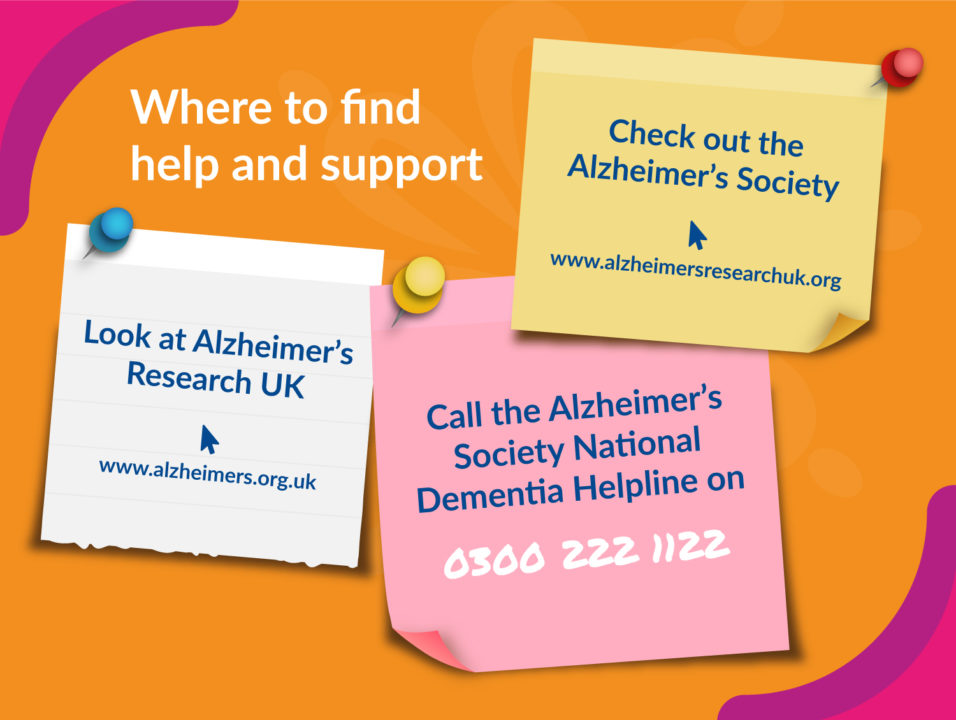Dementia and Alzheimer’s in Home-care
Did you know there are an estimated 850,000 people living with dementia in the UK? In fact, 60% of people receiving home-care services have dementia, meaning that dementia and Alzheimer’s in home-care is part of our everyday lives here at ND Care & Support.

What are Alzheimer’s and dementia?
Alzheimer’s and dementia most often affect people over the age of 65. However, there are also many people living with early onset dementia too. It is a progressive disease of the brain that deteriorates gradually. This means that every dementia sufferer will have a different experience and their symptoms may change over time.
It is a common misconception that Alzheimer’s is just another word for dementia, yet it is, in fact, one of the underlying diseases that cause a range of symptoms known under the umbrella term of dementia. In addition to Alzheimer’s (the most common cause of dementia), there are several other diseases that can cause it too. These include vascular dementia, mixed dementia, dementia with Lewy bodies and frontotemporal dementia. Each of these diseases is different, with varying causes and a range of dementia symptoms.
Symptoms of dementia
Some common symptoms of dementia include:
- Memory loss and forgetfulness
- Difficulty communicating and understanding conversations
- Changes in behaviour – sometimes with restlessness or aggression
- Struggles with day-to-day tasks
- Problems with orientation, such as identifying the date or location you’re in
- Trouble with planning, thinking things through, concentrating and making decisions
With dementia progressing at different rates for everyone and with symptoms affecting each person in a unique way, it is important for those diagnosed with dementia to be able to maintain independence and stay at home for as long as possible. This is where our home-care services come in. It allows us to offer a helping hand when required, in the comfortable surroundings that our clients are most familiar with.
Many of our Care Workers have cared for someone with dementia or Alzheimer’s in home-care settings during their careers, becoming part of the sufferer’s family and helping them to remain at home in their familiar surroundings for as long as possible. Therefore, as September is World Alzheimer’s Month, we want to mark this by sharing some real-life stories from people in ND Care & Support, who have previously cared for friends, relatives and clients with Alzheimer’s and dementia.

Sarah Harding, Recruitment Officer, ND Care & Support
Sarah, who now works as part of the ND Care & Support Cardiff team, has previous experience of working as a Domiciliary Carer. She has fond memories of working with people with dementia and Alzheimer’s in home-care and shares two stories that really stand out:
“During my time working for a care company, I looked after a husband and wife who both had dementia. Initially, I delivered their care as a sole Carer. Unfortunately, as their Alzheimer’s progressed, they required two carers to care for them at home. I looked after them up until they passed away, both within days of one another. Despite their disease, their love was never forgotten. At times they would have me in stitches. Despite their illnesses, they still had that charisma you expect from a couple who have been together most of their lives. But at other times, it was heartbreaking to see them forget who the other was.
Looking after people with dementia has both good and bad days. The important thing for me was to ensure they could feel safe, calm and understand that I was there to help them. During the bad days, you have to be patient. They would forget who the other was, so I was a complete stranger on those days. However, with a little patience and encouragement, I became their safe place, while everything else around them seemed scary.”
“In my former role with the Local Authority, I looked after a lady who had Lewy Body Dementia. Over time, she became increasingly less able to do daily tasks. As her mobility decreased, she required assistance with everyday activities, sometimes with eating and drinking. She often became tired and agitated because she was scared, was in a spell of confusion and even had hallucinations.
The one thing I always remember is her laughter and singing, often in Afrikaans as she grew up in Africa. I tried to join in wherever I could. She was always happy when talking about her life there. This was apparent, because, for a moment, it was as if the disease didn’t affect her. This experience was difficult, where you see how the disease affects the body, while the mind is still working. I hope that during the time I cared for her she felt supported and safe in my company.”
Carol Williams, Care Worker, Crosshands
Carol has had quite a different experience of dementia and Alzheimer’s in home-care compared with Sarah. Although she is a Care Worker with ND Care & Support, her story is more personal:
“I’ve been a carer for many years and no day is ever the same. Except for the fact you can come home, unplug, and recharge your batteries before you delve into another day.
Well, that’s how it used to be… until it dawned on me that I probably do more caring at home than at work. My work-life balance was not your usual dynamic. In fact, there were some days I was going into a work for a break!
When you care for someone with Alzheimer’s, there is no real break. There is only the moment. Whether you are being cherished; accused of stealing; having a lovely quiet minute together; or having to accept that this ever-changing existence is your new norm. However, there are moments of true beauty, like when they recognise your face, even if for only a fleeting moment.
Alzheimer’s took her piece by piece and I’m so glad I took the time to be present when she was present, fall deaf when needed, never take anything personally and always remember who she was. She was my inspiration and my mentor, and now here I was caring for her.
When I speak to my clients’ spouses who are caring for them, they always struggle with reconciling who their partner was with who they are now, and I always say “they are still in there!”
She fell asleep forever after two final restless nights. We were alone, I read to her and the next day, after they removed her body, I went to work to continue caring as I always did.
My first client was a gentleman I’ve been visiting for some time. His wife asked me what she should do, as he keeps calling her in the night and she kept asking him what’s wrong and arguments would break out. I didn’t explain what had happened to me in the night, I simply said when he calls you, go to him and don’t ask him questions. Simply reassure him, let him know he is home and he is ok, then give him a kiss if he will let you. I was aware I would be going home that night and would have a night uninterrupted for the first time in a long time, but no doubt I will hear her calling. The mind is funny like that.”
Support is available

Dementia and Alzheimer’s can be challenging for Carers, whether you are caring in a personal or professional capacity. It can take its toll on you, as well as the sufferer, but don’t forget that there is a multitude of support available to help you cope.
Contact your local ND Care & Support branch today to discuss your options for support with dementia and Alzheimer’s in home-care settings, at absolutely no obligation. Our helpful and friendly team will always be happy to help and guide you in the right direction.
You can also check out the Alzheimer’s Society and Alzheimer’s Research UK for lots of helpful resources, advice and information, or call the Alzheimer’s Society National Dementia Helpline on 0300 222 1122 for a friendly ear.
‹ Previous articleNext article ›